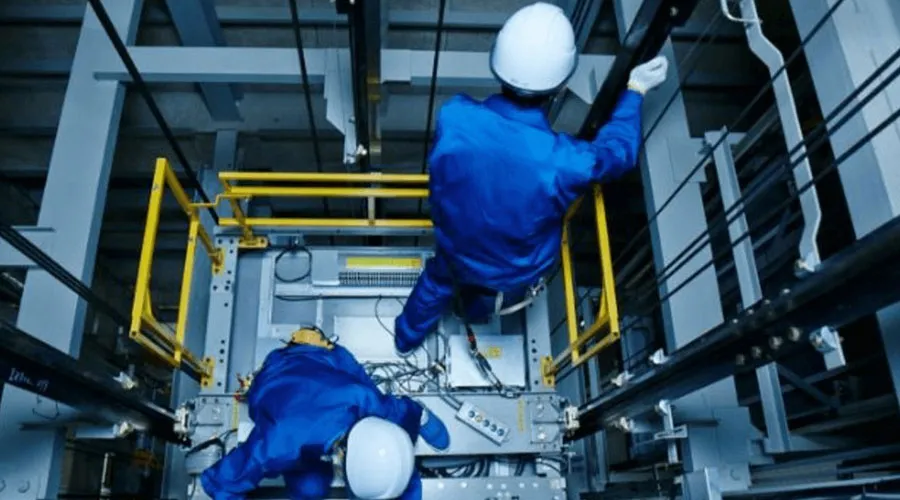Contact us today to discuss your project and experience the best in the industry!

Regular maintenance of goods lifts is crucial for ensuring the safety and efficiency of commercial spaces. Goods lifts play a vital role in the smooth operation of businesses, facilitating the movement of goods and equipment within buildings. In this article, we will explore the importance of maintaining goods lifts, the benefits of regular maintenance, common issues that may arise, and the significance of professional maintenance services. By adhering to safety regulations, proactively addressing maintenance needs, and leveraging expert services, businesses can enhance safety levels, extend the lifespan of their lifts, and optimize operational efficiency.
In commercial spaces, goods lifts play a vital role in the efficient movement of goods and equipment between different levels of a building. They are essential for warehouse operations, retail stores, restaurants, and other businesses that require heavy lifting capabilities.
Regular maintenance of goods lifts is crucial to ensure their safe and efficient operation. Proper maintenance helps prevent breakdowns, reduce safety risks for users and property, and prolong the lifespan of the lifts. It is essential for businesses to prioritize maintenance schedules to avoid costly repairs and maintain smooth operations.
Safety regulations for goods lifts are in place to protect users and property from accidents and ensure compliance with industry standards. Regulations may include weight limits, safety features, regular inspections, and maintenance requirements to prevent malfunctions and hazards.
Businesses must adhere to industry standards and regulations regarding goods lift maintenance to guarantee the safety of users and compliance with legal requirements. Regular inspections and maintenance checks should be conducted by qualified professionals to ensure that the lifts are in proper working condition and meet all safety standards.
Regular maintenance enhances the safety of goods lifts by identifying and addressing potential issues before they escalate into safety hazards. Proper maintenance ensures that lifts operate smoothly, reducing the risk of accidents and injuries to users and preventing damage to property.
Routine maintenance prolongs the lifespan of goods lifts by keeping them in optimal condition and preventing premature wear and tear. Well-maintained lifts are more reliable, durable, and efficient, resulting in cost savings for businesses in the long run by avoiding expensive repairs or replacements.
Common maintenance issues with goods lifts may include worn-out cables, malfunctioning safety features, hydraulic leaks, or motor failures. Regular inspections can help identify these issues early on, allowing for prompt repairs and preventing operational disruptions.
To address maintenance issues proactively, businesses should implement effective maintenance strategies such as regular servicing, lubrication of moving parts, testing safety mechanisms, and keeping detailed maintenance records. Engaging qualified professionals for maintenance tasks can ensure that issues are resolved efficiently, minimizing downtime and maximizing lift performance.
When it comes to maintaining your goods lift, leaving it to the pros is like hiring a superhero for your lift's well-being. Professionals bring a wealth of knowledge and experience to the table, ensuring that your lift stays in top-notch condition.
Outsourcing your lift maintenance to professionals is like having a trusty sidekick by your side. It frees up your time, reduces downtime, and gives you peace of mind knowing that experts are taking care of your lift, so you can focus on running your business smoothly.
Regular maintenance may seem like an expense, but think of it as an investment in your lift's longevity. By crunching the numbers and weighing the costs against the benefits, you'll see that the long-term savings far outweigh the upfront expenses.
Preventative maintenance is like hitting the jackpot in the land of cost savings. By nipping potential issues in the bud before they escalate, you're not just saving money on repairs but also extending the lifespan of your lift, ultimately saving you a fortune in the long run.
Regular maintenance isn't just a tune-up for your lift; it's a performance enhancer. By keeping your lift in tip-top shape, you're ensuring that it operates smoothly, efficiently, and without any hiccups, making your day-to-day operations a breeze.
Maintenance isn't just about keeping your lift running; it's about keeping your business running smoothly. A well-maintained lift means less downtime, improved productivity, and happier customers – all essential ingredients for a well-oiled operational machine.
In the grand scheme of things, regular goods lift maintenance isn't just about safety; it's about keeping the wheels of your business turning smoothly. By investing in professional maintenance, calculating cost-effectiveness, and optimizing operational efficiency, you're not just ensuring the safety of your space but also maximizing its potential for success.
So, here's to safe and efficient commercial spaces – because when your lift is happy, your business is happy!In conclusion, prioritizing regular maintenance of goods lifts is essential for upholding safety standards and ensuring optimal efficiency in commercial settings. By investing in professional maintenance services, adhering to regulations, and addressing maintenance issues promptly, businesses can safeguard their operations, reduce downtime, and prolong the longevity of their goods lifts. Maintaining a proactive approach to lift maintenance not only protects the well-being of individuals using these systems but also contributes to a more streamlined and productive environment within commercial spaces.
Regular maintenance helps to ensure the safe and efficient operation of goods lifts, reducing the risk of malfunctions, accidents, and downtime. It also extends the lifespan of the lifts and minimizes the need for costly repairs.
The frequency of maintenance depends on factors such as the usage of the lift, the environment it operates in, and manufacturer recommendations. Typically, goods lifts should undergo regular inspections and maintenance at least once or twice a year.
Common maintenance issues include worn-out cables, malfunctioning safety mechanisms, hydraulic leaks, and electrical system failures. Identifying and addressing these issues promptly through regular maintenance can prevent more serious problems down the line.
While some businesses may have the expertise to handle basic maintenance tasks, outsourcing goods lift maintenance to professionals is often recommended. Professional maintenance services have the necessary skills, tools, and experience to ensure thorough and compliant maintenance, ultimately enhancing safety and efficiency in commercial spaces.